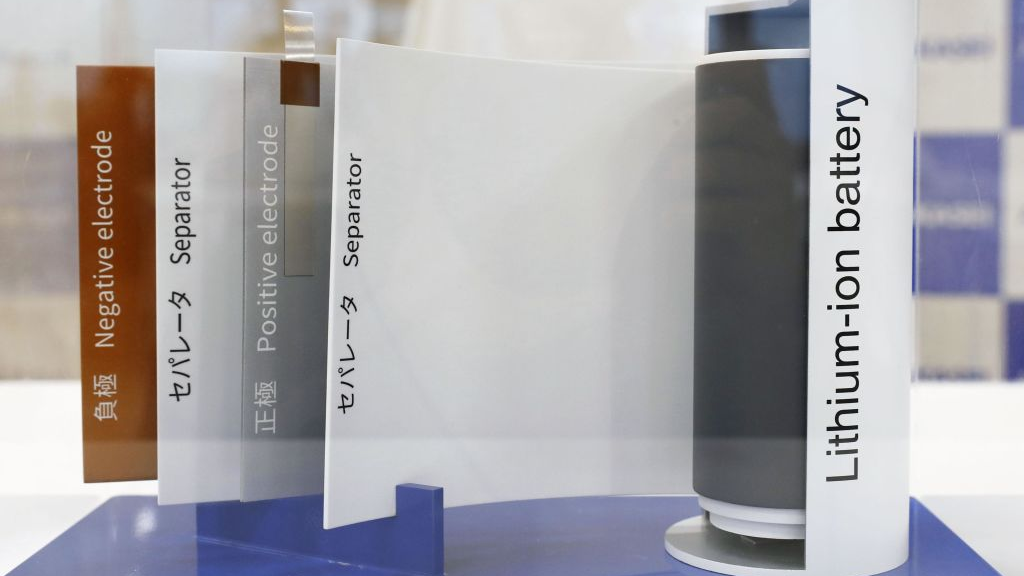
Battery chargers developed by Immotor for electric motorcycles in Shenzhen, China. /Getty
Editor's note: Barry He is a London-based freelance columnist. The article reflects the author's opinions, and not necessarily the views of CGTN.
Lithium reserves for producing rechargeable batteries are increasingly in short supply, adding to the ever expanding list of finite materials which are needed in modern day energy consumption.
A dwindling material which does not command the same public awareness as oil or coal, lithium is like the world's under-appreciated and long-suffering housewife, ready to divorce and leave us behind with serious consequences for our beloved technology in the near future. China's boom in battery use has therefore come at a challenging time, with expanding domestic industries such as electric cars and smartphone production leaving many scientists scratching their heads as to how to solve this issue.
Around 200 million more electric cars are roughly expected to be on roads by 2030, leaving lithium reserves stretched to the max. Many researchers in China and around the world think that lithium can be replaced as an electrical energy storage material by sodium or just common salt. The ramifications of being able to replace such a valuable resource with something as fully functional and abundant as salt could revolutionize how we use energy.
Sodium is a chemical cousin of lithium, and may be able to replicate the process which lithium carries out in rechargeable batteries. To allow batteries to recharge, for example, in electric cars, lithium ions have to flow back to the part of a battery called an anode, in order to recombine with new electrons to restart the charging process. The technology is a tried and tested favorite, first demonstrating mainstream applicability in as early as the 1980s. Nowadays a typical lithium-ion battery can allow a smartphone to be recharged nearly 500 times before performance starts to become affected. It is a tough act for the humble table salt to follow.
Sodium is capable of acting in the same way, but such batteries at first may have to be larger than modern lithium counterparts. This may not be a bad thing however, especially in energy facilities such as wind turbine farms. China leads Asia in green wind energy production, aiming to produce 30 percent of the country's energy through these means by 2030. Solar panels also may not have larger sodium batteries as a limiting factor either.
The applications for such batteries are therefore immediate, if not relevant for smartphones or electric cars straight away. An investment into the advancement of this technology would pay dividends. Sodium based battery cathodes are already in the works, with Chinese companies such as HiNa Battery Technology already turning the concept into fully functional rechargeable components.
Investment into sodium battery research could also ease competition between nations for resources. Lithium mining produces huge amounts of environmental devastation and also could be an undercurrent for geopolitical friction as resources dwindle, which can all be avoided through switching to the virtually unlimited natural salt reserves which exist on Earth.

A mock-up of a lithium-ion battery at Asahi Kasei Corp.'s headquarters in Tokyo, Japan. /Getty
The majority of lithium mines exist exclusively in Australia, in the "lithium triangle," which exists across the borders of Chile, Argentina and Bolivia. Large consumers such as China and emerging economies like Brazil will all have more energy capacity to go around with sodium based innovation, avoiding the need for any future competition.
Many researchers estimate that sodium batteries will start to become competitive with their conventional lithium counterparts around the middle of this decade, when both price and size drops will come into full force. China should carry on investing down this road in order to maintain its position as a global leader in technology production.
The possibilities are endless with even prototypes of batteries produced using salt from seawater being developed in South Korea. Such innovation will have to be accelerated in order to sustain the advancement of all other scientific fields we are all increasingly relying upon. Without efficient battery storage technology, all other industries will have to pass through this bottleneck until it is widened.
Sustainability is high on China's agenda, and sodium batteries should therefore be a priority. Just as countries around the world are investing heavily into renewable energy sources to combat the decline in worldwide fossil fuel stores, so too must we treat lithium energy storage capacity with the same concerns.
According to a study carried out by BP, China currently accounts for as much as 25 percent of global energy consumption, and by 2040 will still be the country which consumes the most energy in the world. Investment into infrastructure is required right now to facilitate this growth, and to ensure that we are not bitten by fully foreseeable resource shortages further down the line.
Being able to use seawater or salt reserves to produce batteries may seem like the stuff of dreams, but in actuality may be our saving grace. It may be a few years before our table salt is able to power our smartphones, but the day is coming, and countries around the world would do well to prepare for it.
(If you want to contribute and have specific expertise, please contact us at [email protected].)
 简体中文
简体中文

